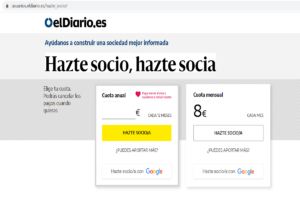
Interessante e creativa iniziativa di marketing per il sito di informazione online spagnolo, che punta alla fidelizzazione del lettore e a una nuova e trasparente strategia di sostenibilità finanziaria in campo giornalistico.
Garantire informazione credibile e di qualità, assieme alla sostenibilità finanziaria delle iniziative editoriali. È questa la grande sfida che vive il giornalismo oggi, a fronte di raccolte pubblicitarie in forte difficoltà e del proliferare di sorgenti informative. Così, mentre sulla rete si riversano di continuo nuovi contenuti, conservare sacche di lettori fidelizzati diventa sempre più complesso.
El Diario, testata online nata in Spagna nel 2012, ha optato per un’interessante e creativa strategia di marketing. Che però non è soltanto tale: è pure ossigeno per una redazione e un progetto editoriale che si propongono di restituire ai lettori un’informazione affidabile, capace di riconciliare società e giornalismo. Un progetto economicamente indipendente e trasparente, che intende la professione come pubblico servizio.

Dieci mesi di letture gratuite e, a seguire, la possibilità di acquistare un abbonamento annuale da 80 euro, o mensile da 8 euro. Il 60% dei lettori opta per il piano annuale. Ma entrambe le formule danno accesso a una serie di vantaggi e servizi, come la navigazione senza annunci pubblicitari, newsletter, una community di oltre 60mila utenti e incontri e promozioni.
L’aspetto più interessante della strategia commerciale di El Diario risiede, però, nella possibilità di sottoscrivere l’abbonamento anche per chi non può permetterselo, semplicemente inserendo nel form predisposto la motivazione.
E i numeri finora hanno dato ragione a El Diario. La testata è finalista al WAN-IFRA’s European Digital Media Awards 2021 nella categoria “People’s Choice – Best Paid Content Strategy”. A luglio 2021 gli utenti unici erano 11 milioni e mezzo e, secondo il Reuters Institute, il sito è il più letto in Spagna tra i media nati esclusivamente sul web e per il web.
Inoltre, quando a marzo dello scorso anno il costo dell’abbonamento è stato aumentato del 33%, la quasi totalità dei lettori (99%) ha accettato la modifica al piano e altri 20mila soci si sono aggiunti. Infine, l’11% dei sostenitori della testata sceglie di diventarne ambasciatore, pagando un sovraprezzo.
I dati di El Diario sono ancora più interessanti se comparati con quanto ha rilevato il Reuters Institute nel 2020 in Stati Uniti, Gran Bretagna e Norvegia. Nei primi due Paesi, rispettivamente il 40 e il 50% degli intervistati ha affermato che nulla potrebbe persuaderli alla sottoscrizione di un abbonamento o all’acquisto di notizie, anche perché possono attingere informazioni da una molteplicità di fonti gratuite. In Norvegia, dove in generale l’interesse nei confronti di un’informazione di qualità è maggiore, la percentuale scende al 19%. L’istituto evidenzia pure che circa il 45% dei norvegesi ha pagato per poter accedere a notizie sul web nel corso del 2020, mentre negli Stati Uniti lo ha fatto solo il 20% degli intervistati e in Gran Bretagna meno di uno su 10.
E in Italia? Nel nostro Paese un trend molto positivo riguarda il Corriere.it, per il quale il 2020 è stato un anno molto positivo con 29 milioni di utenti unici mensili, primo brand tra le testate giornalistiche. Il quotidiano, che a differenza di El Diario nasce off line e accanto alla testata digitale conserva tuttora un’edizione cartacea fruibile attraverso App e web, ha così raggiunto i 300mila abbonati digitali, contro i 164 mila dell’anno precedente, secondo dati Audiweb di novembre 2020.
In generale, l’uso di abbonamenti e paywall da parte dei principali gruppi editoriali italiani si è largamente diffuso a partire dal 2011. Fa eccezione Il Fatto Quotidiano, che prevede l’acquisto di un abbonamento per la versione digitale del giornale cartaceo, ma finora ha optato per la formula “sostenitori”. Chi legge le notizie del sito web, non incontra limitazioni da paywall. Può però diventare sostenitore del progetto editoriale con 60 euro all’anno o 5,99 euro al mese e accedere a servizi aggiuntivi come l’archivio dell’edizione cartacea, la partecipazione una volta alla settimana alle riunioni di redazione e uno spazio nell’area blog dove pubblicare i propri contributi.



